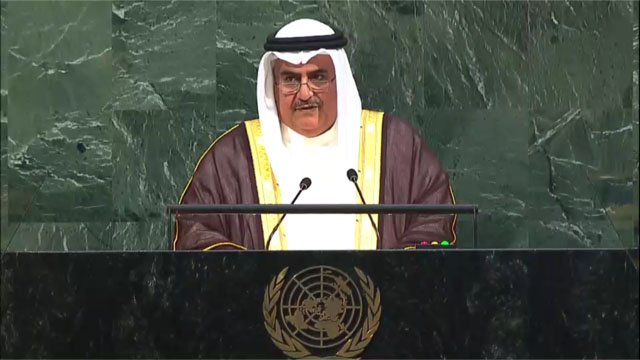Manama: Bahrain has stressed that maintaining stability and security in the Middle East and across the world required a strong and common political will as well as serious collective efforts to guarantee respect for the basic principles underlying relations among states.
These principles include good neighbourliness, non–interference in the internal affairs of other countries and compliance with international conventions and instruments so that terrorism can be addressed and the individuals or entities supporting and financing it be deterred, Minister of Foreign Affairs Shaikh Khalid Bin Ahmad Al Khalifa said as he addressed the United Nations General Assembly.
"All the more so now that terrorism is no longer confined to terrorist organisations that we can confront and eliminate. Rather, it has become a tool in the hands of states determined to create crises in other countries in pursuit of their own agenda. They thus become a full partner in the terrorist acts and a factor of destabilisation of international peace and security," Shaikh Khalid said.
"Considering the strategic importance of peace and security for our vital region, my country is keen to establish strategic partnerships within its own region and with its allies. As partners, we can work together to preserve the security of the Gulf region, to combat terrorism and to provide protection for international navigation and commerce routes, notably through close cooperation between the Bahrain Defense Force and the American Fifth Fleet, based in the Kingdom of Bahrain."
Shaikh Khalid said it was no longer acceptable to have rogue countries occupying others’ territories, violating the sovereignty of states, threatening international peace and security, supporting terrorism, and spreading hate and anarchy.
"It is no longer possible to allow these countries to become parties to our efforts to bring an end to struggles, resolve conflicts and put an end to complex humanitarian tragedies. Those countries were behind the aggravation of these situations. We should not allow them the opportunity to be among us and to misuse their presence among us to satisfy their ambitions and hostile objectives."
Confronting these countries is a duty and a responsibility that the entire international community must shoulder so that they either respect their commitments and catch up with the collective international will to achieve peace, development and welfare, or be held clearly accountable, and suffer isolation and the severe consequences of international resolutions and laws, he added.
The minister said that the decision by Bahrain, Saudi Arabia, the United Arab Emirates and Egypt to cut off relations with Qatar was in order to consolidate anti- terrorist and anti- extremist efforts.
The decision, a sovereign right under international law and supported by several other countries, was taken "after a lengthy period of patience during which we exhausted all available means to halt Qatar’s policies that violated all brotherly relations of good neighbourliness and non-interference in the internal affairs of states, provided financial support and safe haven to terrorists and fugitives, and disseminated a discourse of hate and extremism via its media and the individuals and institutions supporting it."
"Tthe effects of this terrorism, spread to many countries, among them, my own. Qatar has supported systematic terrorist acts which we have suffered from in the Kingdom of Bahrain and which have cost us the lives of many innocent civilians and security personnel, with a view to undermining national security and social peace and overthrowing the government system with the help of parties associated with them," he said.
"We stress the fact that all actions taken against Qatar are directed neither against our peoples nor the Qatari people for whom we have nothing but respect and affection and with whom we are tied by religion, family relations and common history. We will continue to stand by the Qatari people and support their security and stability and for that purpose, our countries have taken a number of measures to accommodate humanitarian cases, notably family relations and health conditions as is amply demonstrated by the latest facilities provided to Qataris by the Kingdom of Saudi Arabia including for Haj and Umra. This confirms the solid ties and refutes assertions of blockade or violations of human rights."
The minister said that the regimes constantly seeking to disseminate anarchy and evil were tools of destruction and would be the biggest losers as they drifted away from the values of collective cooperation among nations.
"This is the case of the Islamic Republic of Iran, where the people suffer from oppression, misery, and poverty, while gallows are hoisted in the streets. Living conditions are harsh and have taken this people, rich in history and civilization, tens of years backward while wasting the people’s resources to feed violence and undermine the region’s security, for the sake of realising Iran’s hegemonic and expansionist ambitions, through its Revolutionary Guard and its satellite organizations such as the terrorist Hezbollah in Lebanon and Syria and the militias in Yemen or the terrorist cells and groups in Bahrain, Saudi Arabia, Kuwait and Iraq as well as other countries that have suffered at length from these adversarial actions," he said.
Establishing normal ties with Iran is subject to it dropping its hegemonic, sectarian, and ideological policies, he added.
"It must respect the national values of peoples and refrain from exporting its revolution based on a theocratic system or government. It must abide by the principles of good neighbourliness and non-interference in the internal affairs. We call on Iran also to end its occupation of the three Emirati islands, Greater Tunb, Smaller Tunb and Abu Musa, and to respond favourably to the peaceful demarches by the United Arab Emirates to recoup sovereignty over its territories either through direct and serious negotiations or by referral to the International Court of Justice."













